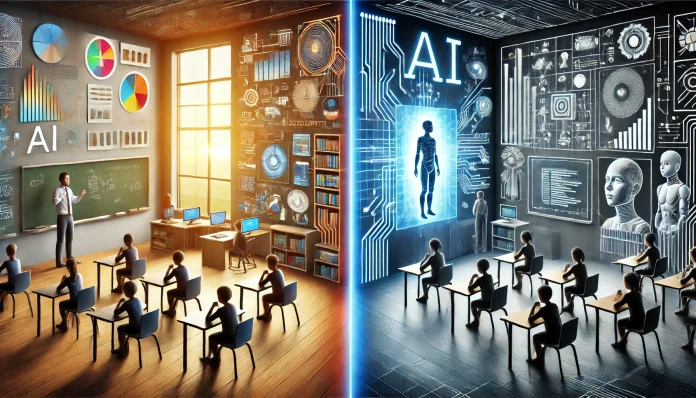AI and Education: Opportunity or Threat?
Artificial Intelligence (AI) is revolutionizing industries worldwide, and education is no exception. While some view AI as a transformative opportunity for education, others perceive it as a potential threat. In this article, we’ll explore both perspectives and discuss the future of AI in shaping how we learn and teach.
Opportunities AI Brings to Education
AI has the potential to significantly enhance educational experiences by making learning more personalized, efficient, and accessible. Here’s how:
1. Personalized Learning Experiences
AI-powered tools, like Khan Academy’s AI Tutor, customize lessons based on each student’s unique needs. These systems analyze performance data and adapt content, offering individualized pathways for learning.
With platforms like Coursera, students worldwide can access personalized recommendations for courses, helping them develop skills aligned with their goals.
2. Enhanced Teacher Support
AI simplifies administrative tasks like grading, scheduling, and tracking student performance. Tools such as Grammarly and automated grading software save educators valuable time, allowing them to focus on fostering creativity and critical thinking in their students.
3. Improved Accessibility
AI-powered technologies, such as text-to-speech software and real-time translation tools, break down barriers for students with disabilities or those in non-native language environments. For instance, Microsoft Translator ensures inclusivity by providing real-time captions for lectures.
4. Bridging the Global Education Gap
With AI, students in remote or underprivileged regions can access high-quality educational resources. Projects like Google’s AI for Social Good are actively working to democratize education and reduce disparities.
The Potential Threats of AI in Education
Despite its benefits, AI in education also presents challenges and risks that must be addressed to ensure ethical and effective integration.
1. Data Privacy Concerns
AI systems rely on vast amounts of student data for personalization. However, without robust data protection policies, this information could be misused or hacked. Schools and developers must comply with laws like GDPR to safeguard student privacy.
2. Over-Reliance on Technology
Excessive dependence on AI may diminish essential human interactions in classrooms. Learning involves emotional and social development, which AI cannot fully replicate. Balancing AI and human input is crucial to maintain a well-rounded education.
3. Inequality in Access
Not all schools and students have access to AI-powered tools due to limited resources or infrastructure. Bridging the digital divide is critical to ensure equitable benefits from AI in education.
4. Job Displacement for Educators
As AI automates tasks and takes on instructional roles, there is concern that it might replace educators. However, experts argue that AI should complement teachers rather than substitute them, enhancing their capabilities instead of eliminating their roles.
Is AI in Education an Opportunity or Threat?
The answer lies in how we implement AI in education. When used responsibly, AI can enhance learning outcomes, empower educators, and expand access to knowledge. However, unchecked implementation without addressing ethical concerns and systemic inequalities could lead to negative consequences.
For example, frameworks like UNESCO’s AI Ethics Guidelines provide a roadmap for using AI responsibly in education systems.
The Future of AI in Education
As AI continues to evolve, its integration into education will become more sophisticated. The focus should remain on using AI as a tool to complement human expertise and address gaps in the current educational system. By fostering collaboration between policymakers, educators, and tech innovators, we can harness AI’s potential while mitigating its risks.
Conclusion
AI presents both opportunities and challenges for education. By striking a balance between innovation and ethics, we can ensure that AI becomes a powerful ally in enhancing learning experiences rather than a disruptive threat.

